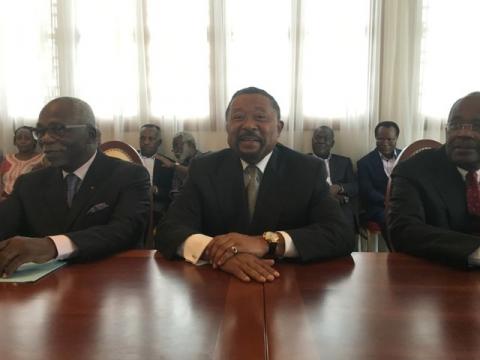Advertisement
Gabon opposition leader rejects Bongo's legitimacy, calls for talks
LIBREVILLE (Reuters) - Gabon's opposition leader Jean Ping called on Thursday for national talks to form a "new republic" and urged foreign powers to impose sanctions on allies of President Ali Bongo, sworn in this week after a disputed election in the oil-producing nation.
Ping remained intransigent during his speech in the capital Libreville, saying he refused to recognise Bongo's presidency. But his appeal for dialogue -- albeit on his own terms -- could help usher in a return to normal after post-election violence last month killed at least six people.
Ping ridiculed Bongo's earlier appeals for talks, saying that the president, who came to power in a contentious 2009 election following his father Omar Bongo's death after 42 years in power, had won fraudulently.
Instead, he said he would organise his own talks, though he provided few details.
"This inclusive national dialogue will be...the occasion to put in place the foundations of a new republic," he said.
Ping also called for sanctions against the authors of what he called "a military-electoral coup d'etat" and urged the prosecutor of the International Criminal Court to come to Gabon to investigate violence after Bongo was declared the winner.
Court prosecutor Fatou Bensouda said in a statement on Thursday that she had begun a preliminary examination of the situation in the country at the request of the government. She will decide later whether to open a formal investigation.
Bongo's victory in last month's poll by less than 6,000 votes drew accusations of fraud from Ping. France called for a recount and the European Union said it found anomalies in Bongo's stronghold province of Haut-Ogooue, where he won 95 percent of the vote on a 99.9 percent turnout.
But fears of resurgent violence after the Constitutional Court upheld Bongo's victory last week failed to materialise and Bongo was sworn in at a subdued ceremony on Tuesday.
He has promised to name an inclusive new government in the coming days and to address some of the issues that have fuelled anger in the country of 1.8 million, like youth unemployment and over-reliance on dwindling oil revenues.
However, the conduct of the poll may hurt his international reputation as a reformer, analysts said. Just a handful of African leaders attended his inauguration.
(Writing by Aaron Ross; editing by Ralph Boulton)



















Add new comment